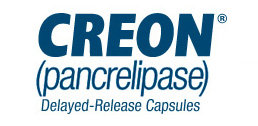Warnings & Recalls for Creon
Patients who take higher doses of Creon have a greater risk of developing a condition known as
fibrosing colonopathy. If untreated this condition can cause the walls of the colon to constrict, and lead to further complications.
Creon
should not be taken by patients who are allergic to pork proteins.
Before taking Creon, be sure to
tell your doctor about the following:
- any medicines, supplements, vitamins or herbal products you are taking
- surgery you may have had on your intestines or pancreas
- if you have a history of pancreatic disease or a blockage in your intestines
- if you have ever had short bowel syndrome in which the length of the intestines has been shortened by surgery of infection
- inflammatory bowel disease
Creon may affect
medications for diabetes by reducing their effectiveness of lowering glucose levels.
Creon and Pregnancy
The
U.S. Food and Drug Administration has assigned Creon as a
pregnancy Category C medicine. It is
not known if Creon may cause harm to the fetus or if Creon may be transferred through the breast-milk and harm a nursing baby. Before taking Creon let your doctor know if you are
pregnant,
may become pregnant, or are
breastfeeding.
Creon Treatment and Use
Creon | Pancrelipase is an enzyme releasing medication marketed by Abbott Laboratories for replacing enzymes in the body which may have been lost due to certain pancreatic conditions. In May of 2009, the U.S. Food and Drug Administration approved Creon for treating children and adults with exocrine pancreatic insufficiency (EPI). Creon may be prescribed to treat the following:
- cystic fibrosis
- obstruction of the pancreatic ducts near the intestines
- chronic pancreatitis (inflammation of the pancreas)
Patients who have recently had surgery to remove the pancreas or stomach, or parts of the pancreas or stomach may be prescribed Creon.
Creon may also be used for testing pancreatic function.
How Does Creon Work?
Creon contains a combination of enzymes which aid in digesting foods and more specifically fat, carbohydrates and proteins. As food travels through the intestines, Creon works to break down these nutrients so they may be more easily digested by the body.
How Should Creon Be Taken?
Creon is available in extended-release capsule form to be taken by mouth with meals. Creon should be taken only as prescribed by your doctor. When taking Creon, swallow the capsule whole with a full glass of water. To avoid irritation of the mouth, do not keep the capsule in your mouth.
If you have trouble swallowing capsules, you may open the capsule and mix its contents with a spoonful of soft food such as yogurt or pudding to be eaten right away. Swallow the medicine immediately and do not chew or bite down on the mixture. Dispose of the capsule directly after use.
Contents of Creon capsules should not be inhaled. For safety, avoid skin contact with powder from capsules.
Continue using Creon as instructed by your doctor. Do not use a different amount or treatment length than recommended. Follow all directions given to you by your doctor including diet and activity guidelines.

